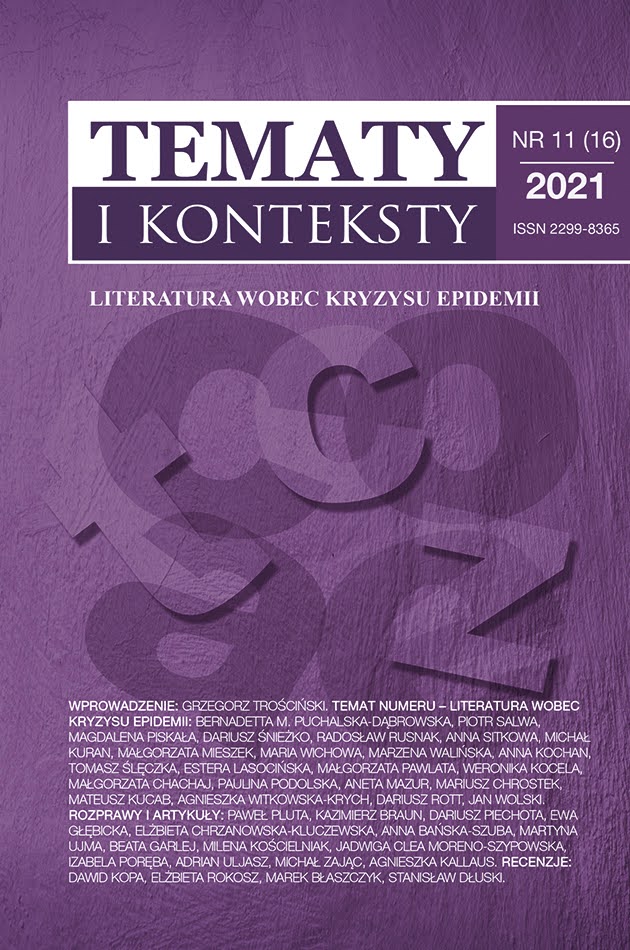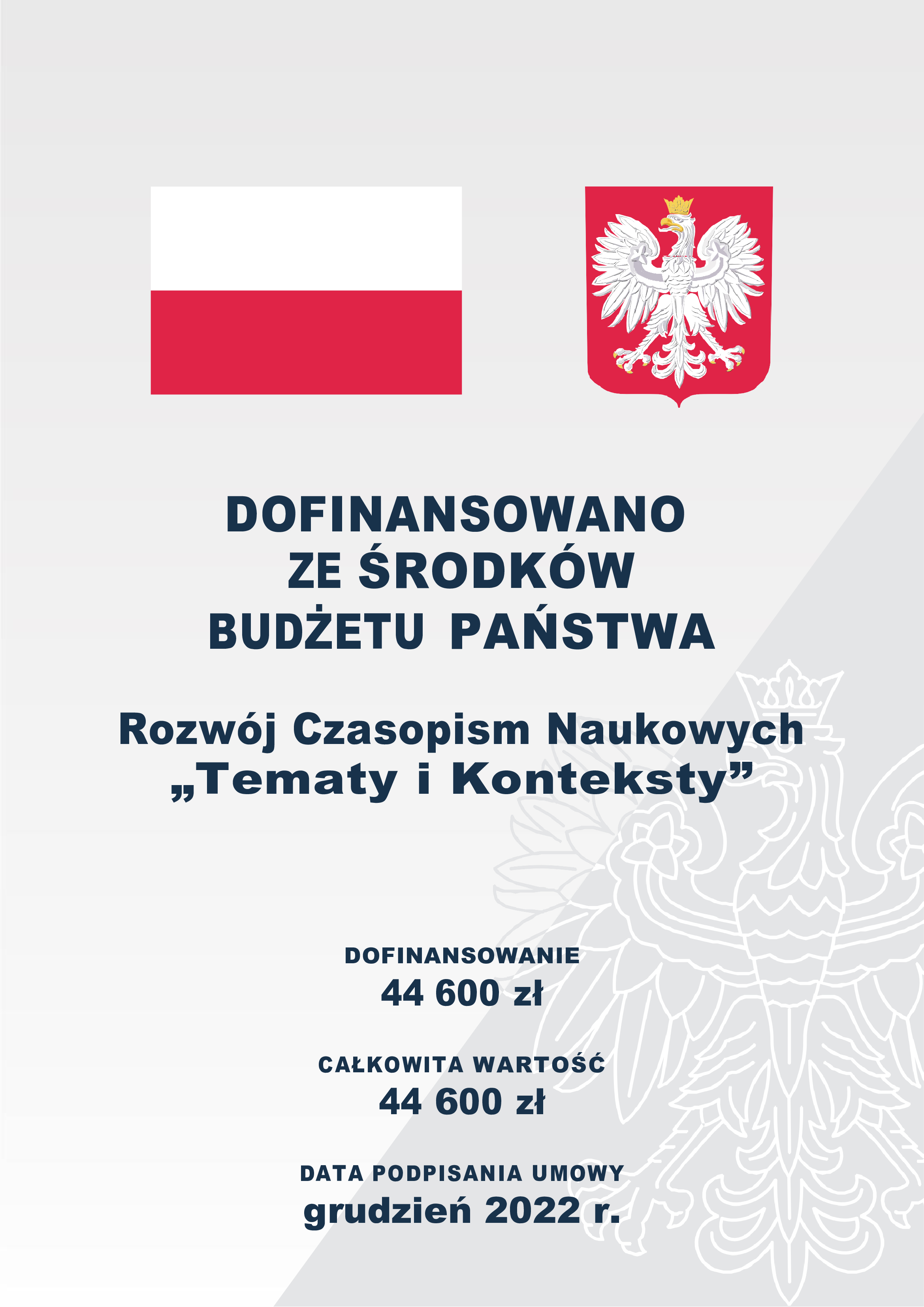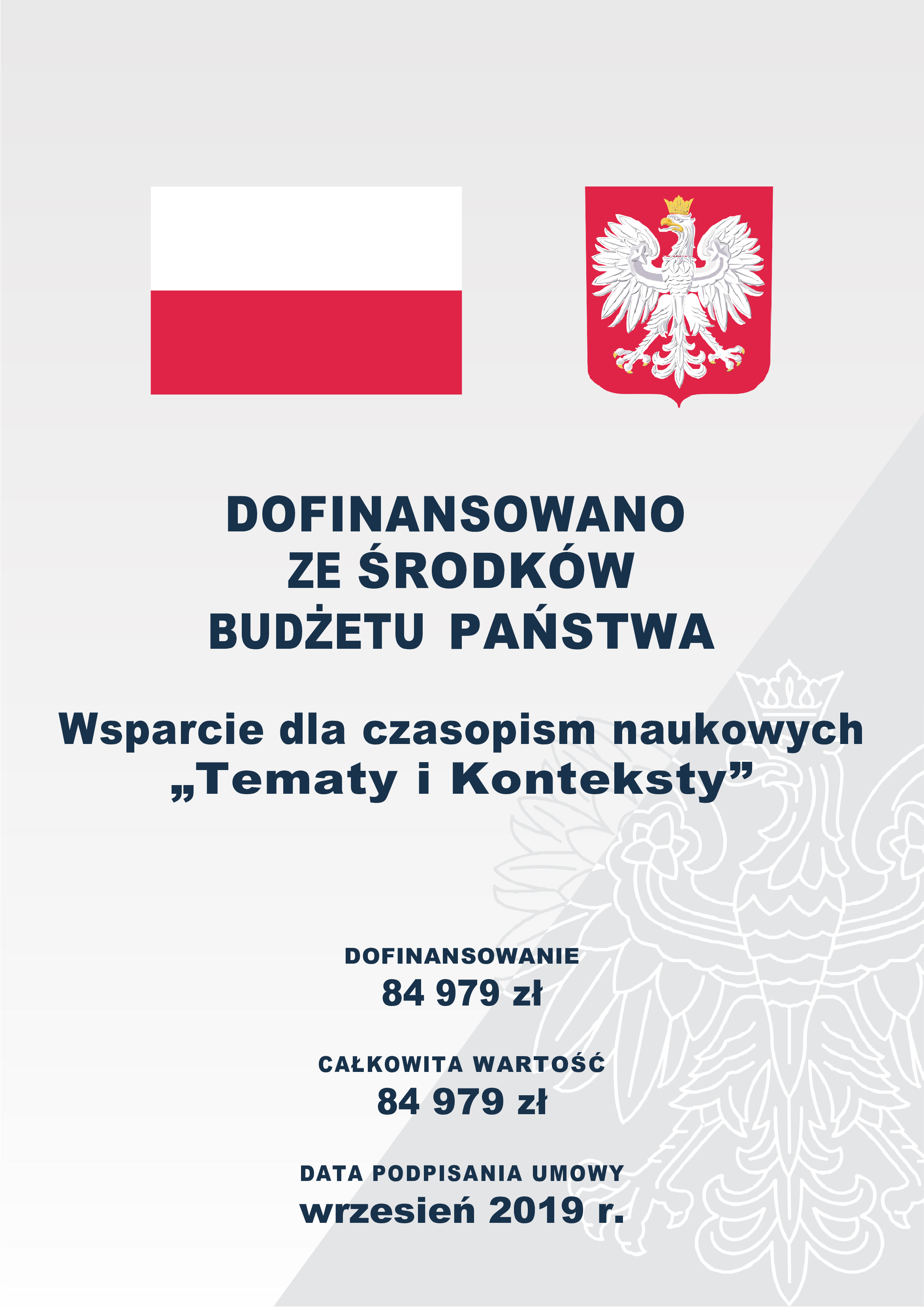Facing Medusa: Jerzy Grotowski’s Approach to Romanticism and the Myth of Faust. Part 1. “Farce-mystery”: Faust by J.W. Goethe in the Polish Theatre in Poznań, 1960
DOI:
https://doi.org/10.15584/tik.2021.38Keywords:
Jerzy Grotowski, Faust, Romanticism, farce-mystery, J.W. Goethe, myth, archetypeAbstract
The subject of this paper is the first of the two re-interpretations of the myth of Faust by Jerzy Grotowski – the performance of Faust by J.W. Goethe in the Polish Theatre in Poznań (1960), in which Grotowski enters into polemics with Goethe’s romantic and metaphysical vision. The spectacle shows Grotowski’s early aesthetics called as “farce-mystery”, displaying his fascination with ritual as a performative secular alternative to religious experience. The myth of Faust shows his creative confrontation with the archetype, which aims to liberate the spiritual energy beyond religion and myth to renew the community’s sense of the sacred. The author sets out to prove that the story of Faust is of crucial significance to Grotowski as an incarnation of myth that helps him to cope with the trauma of death and go beyond the limits of human condition, which reveals his romantic sensibility.
Downloads
References
Eco U., Historia piękna, przeł. A. Kuciak, Poznań 2016.
Flaszen L., Grotowski & Company. Źródła i wariacje, Wrocław 2014.
Grotowski J., Teksty zebrane, Wrocław–Warszawa 2012.
Jamrozek-Sowa A., Reżyser i jego matka – lata rzeszowskie (przyczynek do biografii Emilii Grotowskiej z d. Kozłowskiej i Jerzego Grotowskiego), w: Źródła pamięci: Grotowski – Kantor – Szajna, red. A. Jamrozek-Sowa, A. Adamska, Rzeszów 2013, s. 65–109.
Jung C.G., Archetypy i symbole, Warszawa 1993.
Kofta M., „Faust” odhistoryczniony, w: Misterium zgrozy i urzeczenia, red. J. Degler, G. Ziółkowski, Wrocław 2006, s. 121–122.
Korczak J., Program teatralny do „Fausta” według J.W. Goethego w reżyserii J. Grotowskiego, Teatr Polski w Poznaniu, sezon 1959/60, premiera – 13 kwietnia 1960, https://cyryl.poznan.pl/katalog.php?baza=obiekty&id_obiektu=13960 (dostęp 25.09.2020).
Kosiński D., Farsy-misteria. Przedstawienia Jerzego Grotowskiego w Teatrze 13 Rzędów (1959–1960), Wrocław 2018.
Kosiński D., Grotowski. Profanacje, Wrocław 2015.
Kosiński D., Polski teatr przemiany, Wrocław 2007.
Mańkowski J., Gdy Faust umiera – Mefisto płacze..., w: Misterium zgrozy i urzeczenia, red. J. Degler, G. Ziółkowski, Wrocław 2006, s. 121–122.
Osiński Z., Grotowski i jego Laboratorium, Warszawa 1980.
Osiński Z., Jerzy Grotowski. Źródła, inspiracje, konteksty, Gdańsk 1988.
Osiński Z., Nazywał nas bratnim teatrem. Artystyczna przyjaźń Ireny i Tadeusza Byrskich z Jerzym Grotowskim, Gdańsk 2005.
Osiński Z., Spotkania z Jerzym Grotowskim. Notatki, listy, studium, Gdańsk 2013.
Osiński Z., Szlakiem Grotowskiego: od Teatru Źródeł ku Nienadówce, w: Źródła pamięci: Grotowski – Kantor – Szajna, red. A. Jamrozek Sowa, A. Adamska, Rzeszów 2013, s. 9–64.
Paprocka-Podlasiak B., Faust J.W. Goethego na scenach polskich. Grotowski – Szajna – Jarocki, Toruń 2012.
Pomorski A., Zapiski ze współczesności 1/4, przygotowała J. Szwedowska, Ninateka, https://ninateka.pl/vod/rozmowy/adam-pomorski-zapiski-ze-wspolczesnosci-1-4/ (dostęp 15.09.2021).
Praz M., Zmysły śmierć i diabeł w literaturze romantycznej, przeł. K. Żaboklicki, Gdańsk 2010.
Sajkiewicz V., Scenografia wyczarowana kolorem. Plastyka teatralna Piotra Potworowskiego, „Pamiętnik Teatralny” 1994, nr 3/4, s. 331–364.
Szturc W., Życie i myśli doktora Georgiusa Fausta, w: Postacie i motywy faustyczne w literaturze polskiej, red. H. Krukowska, J. Ławski, t. 1, Białystok 1999, s. 9–29.
The Grotowski Sourcebook, red. R. Schechner, L. Wolford, London–New York 1997.
Tragedia czy groteska? O „Fauście” z Adamem Pomorskim rozmawia Iwona Smolka, autoryzowane opracowanie rozmowy przeprowadzonej na antenie Polskiego Radia w 1999 r., https://www.podkowianskimagazyn.pl/archiwum/faust.htm (dostęp 1.03.2021).
Ziółkowski G., Wstęp, w: Misterium zgrozy i urzeczenia. Przedstawienia Jerzego Grotowskiego i Teatru Laboratorium, Wrocław 2006, s. 9–13.
Downloads
Published
How to Cite
Issue
Section
Categories
License
Copyright (c) 2021 Tematy i Konteksty

This work is licensed under a Creative Commons Attribution-NonCommercial-NoDerivatives 4.0 International License.




